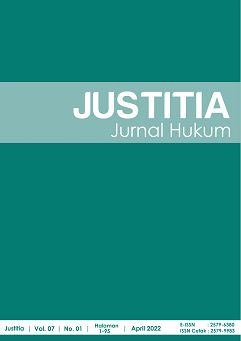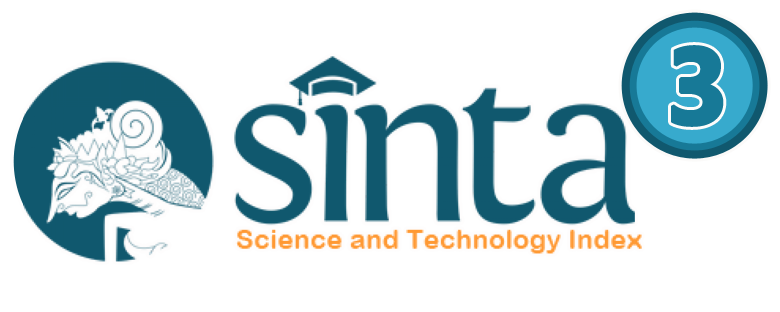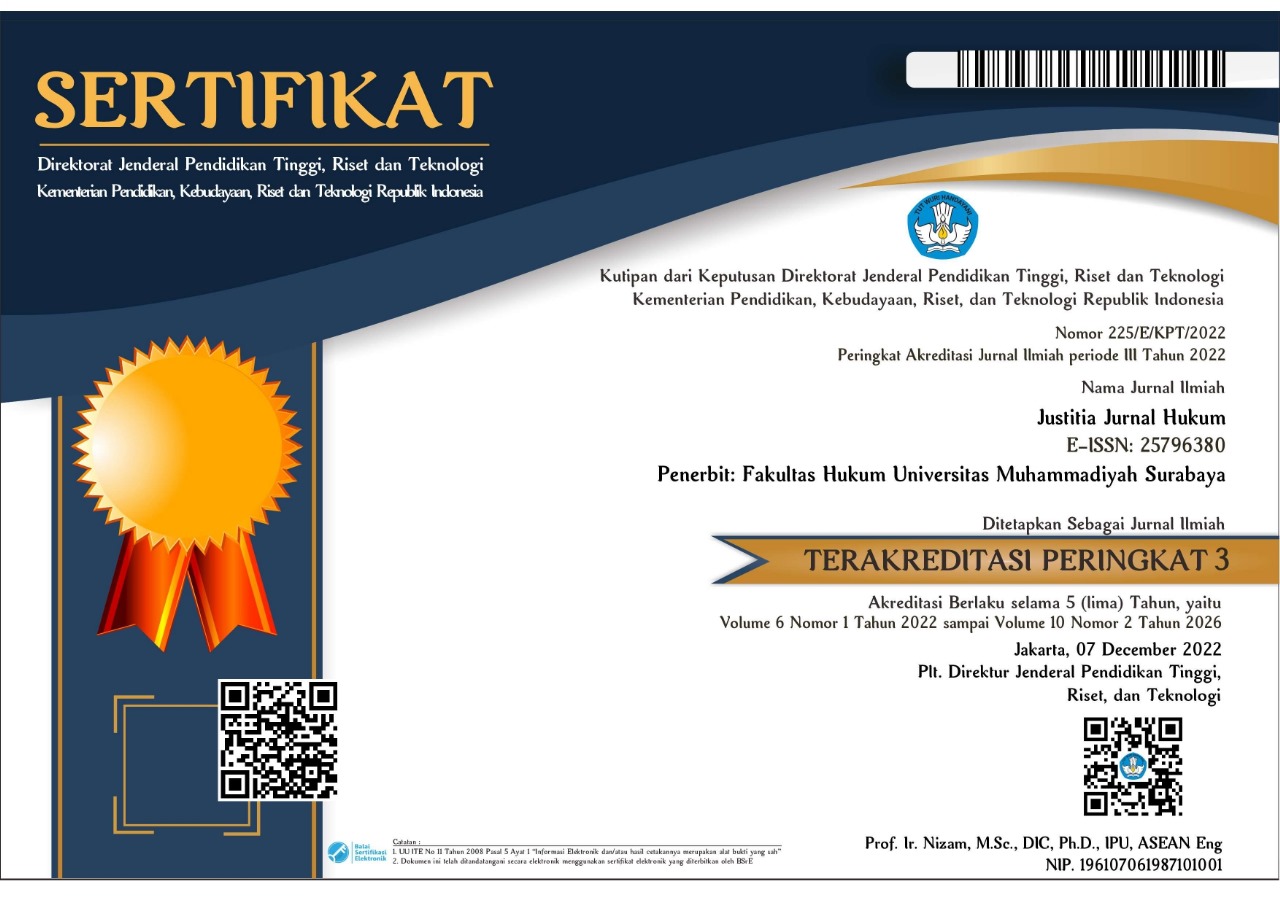The Basis of Minimum Wages Determination for Worker in Indonesia Positive Law and Sharia
DOI:
https://doi.org/10.30651/justitia.v7i1.13157Abstract
This study aims to analyze the basis of wages determination for workers in the perspective of positive law and Sharia. The Labor Act prohibits employers from paying wages below the minimum wage. The threat of criminal sanctions for small employers who cannot afford to pay and there is no sanction for large employers to pay wages to all workers without any differences in work tenure. This research is a normative juridical with statute approach. The results of this study showed that there were differences in parameters in the determination of workers' wages based on the Manpower Act, and sharia principles. The minimum wage parameter based on the Labor Law is the need for a decent living for single workers. While Sharia parameters are more flexible. Determination of wages based on agreement according to the conditions of the parties and provide benefits. In conclusion, the determination of wages based on sharia principles is closer to the sense of fairness for the parties. The recommendation is to revise the parameters for determining the minimum wage
Keywords: benefit; minimum wage; sharia; fairness.
References
Alavi, Hamid Reza. 2007. “Al-GhazÄli on Moral Education.†Journal of Moral Education 36(3).
Amanullah, Muhammad. 2015. “Islamic Ethics and Guidelines for Using Facebook: A Maqasidic Analysis.†In Kuala Lumpur International Business, Economics and Law Conference 8 (KLIBEL8),.
Anderson, Deborah J., Melissa Binder, and Kate Krause. 2003. “The Motherhood Wage Penalty Revisited: Experience, Heterogeneity, Work Effort, and Work-Schedule Flexibility.†ILR Review 56(2).
Armas Pailis, E, Umar Burhan, and Khusnul Ashar. 2016. “The Influence of Maqashid Syariah toward Mustahik’s Empowerment and Welfare (Study of Productive Zakat Recipients on Baznas Riau).†American Journal of Economics 6(2).
Autor, David H. 2019. “Work of the Past, Work of the Future.†AEA Papers and Proceedings 109.
Autor, David H., Alan Manning, and Christopher L. Smith. 2016. “The Contribution of the Minimum Wage to US Wage Inequality over Three Decades: A Reassessment.†American Economic Journal: Applied Economics 8(1).
Barrett, Justin L. 2011. “Cognitive Science of Religion: Looking Back, Looking Forward.†Journal for the Scientific Study of Religion 50(2).
Blau, Francine D., and Lawrence M. Kahn. 2017. “The Gender Wage Gap: Extent, Trends, & Explanations.†Journal of Economic Literature 55(3).
Budig, M. J., and P. England. 2001. “The Wage Penalty for Motherhood.†American Sociological Review 66(2).
Cengiz, Doruk, Arindrajit Dube, Attila Lindner, and Ben Zipperer. 2019. “The Effect of Minimum Wages on Low-Wage Jobs*.†The Quarterly Journal of Economics 134(3).
Draca, Mirko, Stephen Machin, and John Van Reenen. 2011. “Minimum Wages and Firm Proitability.†American Economic Journal: Applied Economics 3(1).
Dube, Arindrajit, T. William Lester, and Michael Reich. 2016. “Minimum Wage Shocks, Employment Flows, and Labor Market Frictions.†Journal of Labor Economics 34(3).
El-Najar, Noura, and Hamdan Bin Mohammed. 2014. “The Application of Maqasid Al Sharia’h in Islamic Banking & Finance.†Leading Transformation to Sustainable Excellence.
Goos, Maarten, and Alan Manning. 2007. “Lousy and Lovely Jobs: The Rising Polarization of Work in Britain.†Review of Economics and Statistics 89(1).
Gorry, Aspen. 2013. “Minimum Wages and Youth Unemployment.†European Economic Review 64.
Grégoire, Philippe. 2018. “Psychology at Work.†International Review of Economics 65(2): 119–35. https://doi.org/10.1007/s12232-017-0286-3.
Griffel, Frank. 2009. Al-Ghazali’s Philosophical Theology Al-Ghazali’s Philosophical Theology.
Hartono, Sri, and Agus Sobari. 2017. “Sharia Maqashid Index as a Measuring Performance of Islamic Banking: A More Holistic Approach.†Corporate Ownership and Control 14(2).
Hashim, Azmil. 2015. “Correlation between Strategy of Tahfiz Learning Styles and Students Performance in Al-Qur’an Memorization (Hifz).†Mediterranean Journal of Social Sciences 6(2S5).
Ikhsan Ramdhoni, Mokhamad. 2018. “Assessing Bank Performance Measurement in Islamic Banking Industry.†In MATEC Web of Conferences,.
International Labour Organization. 2016. Just Labour: A Canadian Journal of Work and Society Global Wage Report 2016/17: Wage Inequality in the Workplace.
Krueger, Alan B., and Andreas I. Mueller. 2016. “A Contribution to the Empirics of Reservation Wages.†American Economic Journal: Economic Policy 8(1).
Krygier, Martin. 2018. “Why the Rule of Law Matters.†Jurisprudence 9(1).
Lafont, Cristina. 2009. “Religion and the Public Sphere: What Are the Deliberative Obligations of Democratic Citizenship?†Philosophy and Social Criticism 35(1–2).
Losonczi, Péter. 2012. “ The Power of Religion in the Public Sphere .†Political Theology 13(6).
March, Andrew F. 2011. “Islamic Legal Theory, Secularism and Religious Pluralism: Is Modern Religious Freedom Sufficient for the Shari’a ‘Purpose [Maqsid]’ of ‘Preserving Religion [Hifz Al-Din]?’†SSRN Electronic Journal.
Martins, Pedro S., Alvaro A. Novo, and Pedro Portugal. 2021. “Increasing the Legal Retirement Age: The Impact on Wages, Worker Flows and Firm Performance.†SSRN Electronic Journal.
McDermott, T. E., I. Drezga, and R. P. Broadwater. 1999. “A Heuristic Nonlinear Constructive Method for Distribution System Reconfiguration.†IEEE Transactions on Power Systems 14(2).
McHugh, Matthew D., and Chenjuan Ma. 2014. “Wage, Work Environment, and Staffing: Effects on Nurse Outcomes.†Policy, Politics, and Nursing Practice 15.
Mifrahi, Mustika Noor, and Faaza Fakhrunnas. 2018. “Islamic Bank Peformance Based on Maqasid Based Performance Evaluation Model (MPEM).†Jurnal Ekonomi & Keuangan Islam 4(2).
Neumark, David, and William L. Wascher. 2007. “Minimum Wages and Employment.†Foundations and Trends in Microeconomics 3(1).
———. 2013. “The Effects of Minimum Wages on Employment.†In Minimum Wages,.
Nugraha, Erik, Lucky Nugroho, Citra Lindra, and Wiwin Sukiati. 2020. “Maqashid Sharia Implementation in Indonesia and Bahrain.†ETIKONOMI 19(1).
Nurhadi, Nurhadi. 2019. “The Importance of Maqashid Sharia as a Theory In Islamic Economic Business Operations.†International Journal of Islamic Business and Economics (IJIBEC) 3(2).
Oppy, Graham, and Nick Trakakis. 2010. The History of Western Philosophy of Religion: Volume 4 Nineteenth-Century Philosophy of Religion The History of Western Philosophy of Religion.
Ottaviano, Gianmarco I.P., and Giovanni Peri. 2012. “Rethinking the Effect of Immigration on Wages.†Journal of the European Economic Association 10(1).
Rahman, Faried Kurnia, Mohammad Ali Tareq, Rochania Ayu Yunanda, and Akbariah Mahdzir. 2017. “Maqashid Al-Shari’ah-Based Performance Measurement for the Halal Industry.†Humanomics 33(3).
Razak, Nurul Ain Nadiah binti Abd. 2015. “Konsep Hifz Mal Dalam Pengurusan Harta Pusaka Di As-Salihin Trustee Berhad.†Prosiding Seminar Antarabangsa Pengurusan & Kepimpinan Islam : Isu dan Cabaran 7.
Roediger, David R. 2017. “The Wages of Whiteness.†In Class,.
Rogerson, Richard, Robert Shimer, and Randall Wright. 2005. “Search-Theoretic Models of the Labor Market: A Survey.†Journal of Economic Literature 43(4).
Rusydiana, Aam S., and Irman Firmansyah. 2018. “Efficiency versus Maqashid Sharia Index: An Application on Indonesian Islamic Bank.†Shirkah: Journal of Economics and Business 2(2).
Rusydiana, Aam, and Yulizar Djamaluddin Sanrego. 2018. “MEASURING THE PERFORMANCE OF ISLAMIC BANKING IN INDONESIA: AN APPLICATION OF MASLAHAH-EFFICIENCY QUADRANT (MEQ).†Journal of Islamic Monetary Economics and Finance 3.
Sanrego, Yulizar D. 2017. “The Minimum Wage Formulation From Maqashid Al-Sharia Perspective: A Case of Indonesia.†Share: Jurnal Ekonomi dan Keuangan Islam 6(2).
Schmitt, Peter A. 2019. “Translation 4.0-Evolution, Revolution, Innovation or Disruption?†Lebende Sprachen 64(2).
Setiati, Siti, and Muhammad Khifzhon Azwar. 2020. “COVID-19 and Indonesia.†Acta medica Indonesiana 52(1).
Statman, Meir, and Denys Glushkov. 2009. “The Wages of Social Responsibility.†Financial Analysts Journal 65(4).
Stolper, Wolfgang F., and Paul A. Samuelson. 1941. “Protection and Real Wages.†Review of Economic Studies 9(1).
Wijayanti, Asri. 2020. “Al Ujroh as an Alternative of a Fair Wage Setting Solution.â€
Wright, James D. 2015. International Encyclopedia of the Social & Behavioral Sciences: Second Edition International Encyclopedia of the Social & Behavioral Sciences: Second Edition.
Downloads
Published
How to Cite
Issue
Section
License











